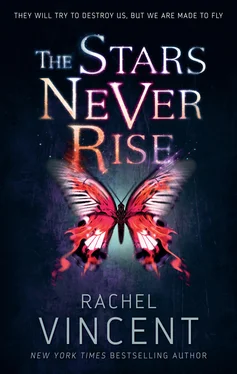“It means you have to do what the Church says, even if you don’t want to. Just like at home, when your mom says you have to eat your peas, even though they’re yuck.”
I smiled at him, and my knee banged the underside of the short table when I tried to uncross my legs. “That’s exactly right.” But the Church’s “peas” were usually much more difficult to swallow. “And the third obligation?” The last three hands went up. “Jessica?”
“Penti … Penna … Pen …”
“Penitence,” I finished for her. “Good. And what does that mean?”
“It means that when you do something wrong, you have to feel bad about it. Real bad. And you gotta try to fix it.”
“That’s right. And—”
“Like with Matthew.” Elena’s smile faded and her little forehead furrowed. “He didn’t feel bad about what he said, so Sister Camilla made him feel bad.”
I glanced at Matthew Mercer’s empty chair, at the end of our semicircle. The rain was coming down so hard that I couldn’t see him through the window. I could only see gray misery and the steady pelting of rain against the glass.
“Okay, there’s one more.” I dragged my attention back to the kids in front of me, in their white shirts and navy pants, smaller versions of my own uniform. “The people owe the Church devotion, obedience, penitence, and what? Robby? Can you tell us?”
“He got the easy one …,” Jessica whispered, and I frowned at her.
“Worship,” Robby said. “That means you gotta love the Church.”
“Good.” At their age, faith was more about memorization than anything. Fortunately, five-year-olds have great memories. “Now let’s move on to something more fun. Who can tell me what we learned yesterday about soul donors?”
Hands shot into the air, and for the next few minutes, the kids explained to me that since the Great Purification a century ago, donors were necessary because babies without souls die within an hour of their birth.
“Who can tell me why there aren’t enough souls to go around anymore?”
Robby spoke quietly. The tone of our unit had changed, and he looked scared. “Demons ate them.”
I nodded solemnly.
Actually, demons consumed the souls of those they possessed. But that distinction was hard to explain to small children.
Degenerates were easy to identify. Fresh demonic possessions were much, much more difficult to recognize, because when a demon possesses a human, it has access to its victim’s memories. Most demons are very good at impersonating their victims. They do it for years, until the soul of the victim has been completely devoured.
Once that happens, if the demon can’t find a new host, it becomes stuck in the soulless body, which begins to mutate and degrade, both physically and mentally. Eventually, those soulless, end-stage possessions become degenerates—mindless mutated monsters with inhuman strength and speed, and demonic appetites. They stalk the shadows in search of new souls, but because they’ve lost most mental function, instead of simply possessing a new host, they tear the poor victim to pieces, literally devouring human flesh in search of that vital soul.
But those details aren’t taught to five-year-olds. In kindergarten we keep it simple.
“Today we’re going to talk about the shortage of souls and the generational obligation of the people.” That was a mouthful for a five-year-old, but even kindergartners had been hearing those phrases for most of their lives. “Do you all know who your donors were?”
Robby’s hand shot up, but he answered before I could call on him. “My grandpa was my donor. I’m his namesake, so I get to put flowers on his grave every year on my birthday. But my mom cries, even though I got to live.”
“I’m sure they’re happy tears.”
I was lying. People don’t cry in graveyards because they’re happy. But sometimes you have to lie to little kids. Sometimes you have to lie to not-so-little kids too.
I turned to Jessica, who was twirling a thin strand of dark hair around her finger. “What about you, Jessie? Do you know who your donor was?”
She shook her head. “My donor was from the public registry. ” She said the words slowly. Carefully. Reverently.
I blinked at her in surprise. “Well then, you’re extra lucky, aren’t you?” I tried not to think about how nervous her mother must have been toward the end of her pregnancy.
Family donations are the norm, and most donors are memorialized in the new child’s name, or by the celebration of the donation along with the child’s birthday every year.
It’s considered an honor for the elderly to give up their lives and their souls at the moment of a child’s birth so the next generation can live. It’s also considered an obligation. In fact, in most cases, the Church won’t grant a parenting license until the prospective parents have a family donor lined up. The public registry is for emergencies. For cases when the donor dies before it’s safe to induce the baby’s birth, and for rare accidental pregnancies, when there is no family member willing to donate a soul for a child he or she will never see.
People who haven’t already promised their souls to a family member’s child are added to the public registry at the age of fifty and instructed to get their affairs in order. It’s a short list. Most people want their souls to stay in the family, and those who want to grow old sometimes promise a donation to the child of a niece or nephew who’s still several years away from marriage, and even farther from parenthood.
Selfish? Yes. But until the Church comes up with a law to stop it, donor procrastination is also perfectly legal.
When a baby nears birth without a promised soul, it’s assigned a donor from the top of the public registry. Rarely—tragically—a town’s public registry will sit empty for a few days, and inevitably during that time, babies are stillborn for lack of a soul.
“Do you do anything special for your donor on your birthday?” I asked Jessica.
“We give thanks and set a place for her at my birthday party. No one sits in that chair, even though she’s not really there. Mommy says it’s symbiotic.”
I hid a smile. “I think you mean ‘symbolic.’ “
“Yeah.” Jessica turned to her classmates with an air of authority. “ ‘Symbolic’ means no one can sit in that chair, even though it’s empty.”
Across the room from our learning center, the classroom door opened and I glanced up from my group of kindergartners to find Sister Anabelle standing in the doorway.
“Sister Camilla, could I please borrow Nina for the rest of the hour?”
Sister Camilla nodded, and Anabelle gestured for me to hurry, so I passed out parable-themed coloring sheets and crayons for my group, then scurried into the hall.
Anabelle closed the door behind me. “They’re about to start the sophomore class physicals. I thought you might want to spend your service hour there today, since Melanie’s …” She frowned at my blank look. “Mellie didn’t tell you?”
“No.” But with that new bit of information, the pieces fell into place in my head. No wonder my sister was nervous that morning. The problem wasn’t her history test, it was her physical exam.
My sophomore physical was the single worst day of my life. Even compared to a degenerate attack in a dark alley.
“Come on.” Anabelle grabbed my arm and tugged me down the hall. “They’re about to start the assembly.”
We got there just as the last of the tenth-grade girls filed into their seats in the auditorium, wide-eyed and obviously scared. The boys would be addressed separately, and I wondered if they would be half as nervous as the girls were. There was no whispering or nudging in line. No one played with anyone else’s hair. No one scribbled on incomplete homework papers or rushed to finish the assigned reading. They just stared at the stage, where a nurse in her pristine white slacks and matching cassock—the bloodred embroidery meant she was consecrated—stood next to the acting headmaster, Sister Cathy.
Читать дальше












